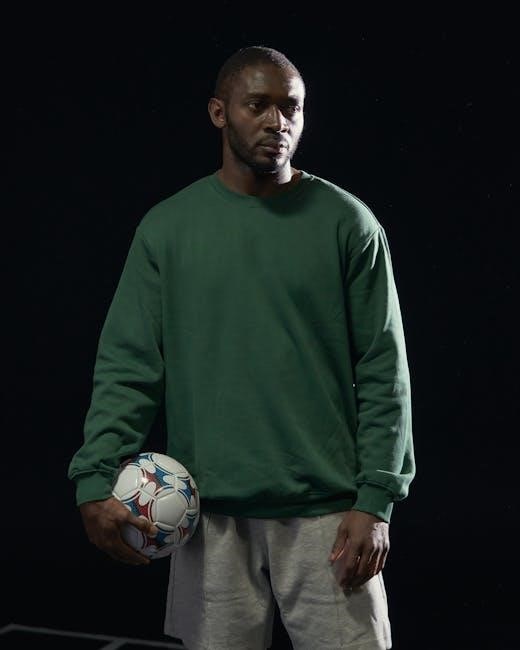determined robert sapolsky pdf

Robert Sapolsky’s latest book, Determined, challenges the notion of free will, arguing that human behavior is shaped by genetics, environment, and past experiences, rendering choice an illusion. A New York Times bestseller, it masterfully blends neuroscience, philosophy, and storytelling to explore how biology and external factors dictate our actions, urging a shift toward empathy and a reevaluation of moral responsibility.

Overview of Robert Sapolsky and His Work
Robert M. Sapolsky is a renowned neuroendocrinologist and professor of biology and neurology at Stanford University. A recipient of the MacArthur Foundation Genius Grant, he is celebrated for his interdisciplinary approach to understanding human behavior. Sapolsky’s work bridges neuroscience, psychology, and evolutionary biology, offering insights into the biological and environmental factors shaping our actions. His previous books, such as Behave and A Primate’s Memoir, have been widely acclaimed for their accessible and engaging style. Sapolsky is known for his ability to translate complex scientific concepts into compelling narratives, making him a leading voice in the public understanding of science. His work challenges traditional views of free will, emphasizing the role of genetics, environment, and past experiences in determining human behavior.
The Central Thesis of the Book
Robert Sapolsky’s central argument in Determined is that free will is an illusion. He contends that human behavior is entirely shaped by a combination of genetics, environment, and past experiences, leaving no room for genuine self-determination. Sapolsky draws on neuroscience, biology, and psychology to demonstrate how every decision, from the mundane to the profound, is the inevitable result of prior causes. He argues that the concept of free will is a comforting myth that obscures the reality of deterministic forces at work. By dissecting the interplay of biology and external influences, Sapolsky challenges readers to reconsider their understanding of choice and responsibility. His thesis is both provocative and profound, with significant implications for how society approaches morality, justice, and human behavior.
Determinism vs. Free Will: The Core Debate

Robert Sapolsky argues that human behavior is entirely determined by genetics, environment, and past experiences, leaving no room for free will, which he calls an illusion.
The Role of Genetics in Shaping Behavior
Robert Sapolsky emphasizes that genetics play a pivotal role in determining human behavior, influencing traits such as aggression, decision-making, and susceptibility to mental health disorders. He argues that genetic factors, often interacting with environmental influences, shape the brain’s structure and function, thereby predetermining behavioral outcomes. Sapolsky highlights how specific genes can predispose individuals to certain behaviors, illustrating that biological inheritance significantly constrains the range of possible choices. By examining the interplay between genes and environment, he demonstrates that behavior is not a result of free will but rather a complex interplay of factors beyond individual control. This perspective challenges the notion of personal responsibility, urging a shift toward empathy and understanding in addressing human actions. Sapolsky’s analysis underscores the profound impact of genetics on behavior, reinforcing his argument against the existence of free will.
Environment and Nurture: Influences on Decision-Making
Robert Sapolsky thoroughly explores how environment and nurture significantly influence human decision-making, complementing the role of genetics. He argues that upbringing, culture, and personal experiences shape behavior, often in ways that are deeply intertwined with biological factors. Sapolsky highlights how early life experiences, social norms, and environmental stressors can profoundly impact brain development and behavior, further undermining the concept of free will. By examining the interplay between nature and nurture, he demonstrates that external factors, beyond individual control, play a crucial role in shaping choices. This understanding challenges traditional notions of personal responsibility, emphasizing the need for empathy and systemic change. Sapolsky’s analysis of environmental influences underscores the complexity of human behavior, reinforcing his argument that decision-making is largely determined by factors beyond conscious control.
The Neuroscience of Choice: Brain Structure and Function
Robert Sapolsky delves into the neuroscience behind decision-making, revealing how brain structure and function dictate our choices. He explains that every decision arises from neuronal activity, with brain regions like the prefrontal cortex and basal ganglia playing pivotal roles. Sapolsky argues that the brain operates deterministically, with each choice being the inevitable outcome of prior biological and environmental influences. He underscores that consciousness often serves as a post hoc narrator rather than a controller of decisions. By examining the molecular and cellular mechanisms underlying behavior, Sapolsky demonstrates that our sense of agency is an illusion. The brain, he contends, is a “meat machine” whose operations are fully governed by physical laws, leaving no room for free will. This neuroscientific perspective fundamentally reshapes how we view human behavior and responsibility.

Challenging the Notion of Free Will
Robert Sapolsky argues that free will is an illusion, contending that human behavior is entirely determined by genetics, environment, and brain function, leaving no room for genuine choice.
Quantum Mechanics and Chaos Theory: Do They Leave Room for Free Will?

Robert Sapolsky delves into quantum mechanics and chaos theory, exploring whether these fields offer any basis for free will. While quantum indeterminacy introduces randomness, he argues it doesn’t equate to intentional choice. Chaos theory, with its sensitivity to initial conditions, suggests unpredictability but not conscious decision-making. Sapolsky counters that even if these phenomena provide gaps in determinism, they don’t enable free will, as they remain beyond human control. He emphasizes that human behavior is still governed by prior causes, making free will an illusion. Thus, these theories don’t justify the concept of free will but instead reinforce the idea that our choices are ultimately determined.
Emergent Complexity and Its Impact on Human Behavior
Robert Sapolsky examines how emergent complexity influences human behavior, where complex systems give rise to unpredictable patterns. He argues that while these patterns may seem spontaneous, they stem from deterministic processes. Sapolsky illustrates that human behavior, though intricate, is shaped by genetics, environment, and past experiences, leaving no room for free will. He maintains that even complex systems operate within deterministic bounds, challenging the notion that emergent phenomena could enable free choice. This perspective underscores Sapolsky’s broader argument that human behavior is entirely determined, emphasizing the need for empathy and a reformed justice system that acknowledges this reality. By exploring these complexities, Sapolsky provides a compelling case for a world without free will, urging a shift in how we view moral responsibility and human action.

Moral and Ethical Implications
Sapolsky explores the moral and ethical implications of hard determinism, arguing that recognizing the absence of free will fosters empathy and challenges traditional notions of blame and punishment.

Punishment, Responsibility, and the Justice System
Sapolsky challenges traditional notions of punishment and responsibility, arguing that if free will is an illusion, retribution becomes morally unjustified. He contends that the justice system should shift from punishment to rehabilitation, focusing on understanding the biological and environmental factors that drive behavior. By recognizing that actions are the result of factors beyond individual control, society can move toward empathy and prevention rather than blame. This perspective aligns with Sapolsky’s broader vision of a more humane world, where addressing root causes of behavior replaces punitive measures. The book emphasizes that acknowledging determinism does not lead to chaos but rather to a more compassionate approach to justice and human interaction.
Toward a More Humane Society: The Consequences of Accepting Determinism
Accepting determinism, as Sapolsky argues, paves the way for a more compassionate society by shifting the focus from punishment to comprehension and rehabilitation. By understanding that behavior is shaped by genetics, environment, and past experiences, we can address the underlying causes rather than merely punishing outcomes. This perspective encourages the creation of policies and support systems that prevent harmful behaviors by targeting their origins. Determinism fosters empathy in both personal and societal interactions, advocating for a world where blame is replaced with support. This approach not only enhances individual well-being but also strengthens community bonds, leading to a more ethical and structured society. By prioritizing prevention and understanding, we can build a future where empathy and compassion guide our actions, creating a harmonious and supportive environment for all.
Sapolsky concludes that embracing determinism can lead to a more compassionate society, where understanding replaces blame. This shift fosters empathy and rehabilitation, paving the way for a more ethical future.
Sapolsky’s Vision for a World Without Free Will
Robert Sapolsky envisions a society where the illusion of free will is replaced by empathy and understanding. He argues that recognizing the determinism behind human behavior can foster a more compassionate world, where blame is replaced by rehabilitation and support. Sapolsky suggests that this shift would transform how we approach punishment, mental health, and social inequality. By acknowledging that our choices are the result of biology, environment, and past experiences, society could move toward a system focused on prevention rather than retribution. This vision emphasizes the potential for human progress through scientific understanding and moral responsibility, urging us to embrace determinism as a pathway to a more humane and equitable future.
The Broader Cultural and Scientific Significance of “Determined”
Determined holds profound cultural and scientific significance, challenging traditional views on free will and moral responsibility. Sapolsky’s work bridges neuroscience, psychology, and philosophy, offering a comprehensive understanding of human behavior. By examining the interplay of genetics, environment, and neuroscience, the book provides a robust argument against free will, resonating across disciplines. Culturally, it prompts a reevaluation of justice systems and personal accountability, advocating for empathy over punishment. Scientifically, it contributes to ongoing debates about determinism and consciousness. The book’s accessible style ensures its ideas reach a broad audience, fostering public discourse on complex topics. Ultimately, Determined is a pivotal work that could reshape societal attitudes toward human behavior, encouraging a more compassionate and informed approach to understanding ourselves and others.